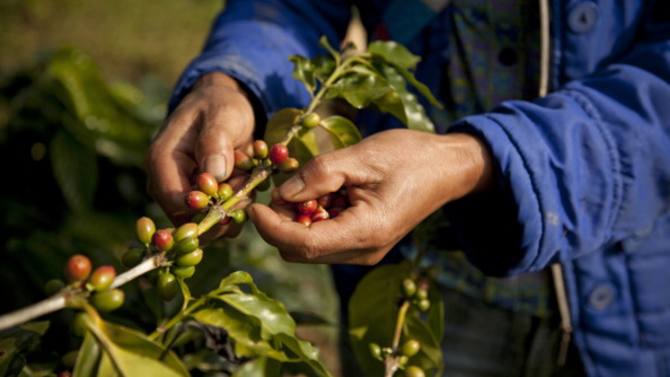The output and quality of Yunnan small grain coffee are growing simultaneously, attracting international buyers.

For professional baristas, please follow the coffee workshop (Wechat official account cafe_style)
In the past 10 years, the output of Yunnan small-grain coffee has been growing steadily, and its quality stability has been continuously improved, which has begun to be recognized by roasters all over the world. Colombian coffee bean production has recently declined due to leaf rust, which has boosted China's coffee bean exports.
Volcafe, a well-known multinational coffee trader, has set up a procurement and processing joint venture in Yunnan, a move that is expected to boost China's exports of high-quality coffee beans.
The production of Yunnan Arabica coffee beans (arabica, also known as small-grain coffee) has been growing steadily over the past decade. Traders say its quality has improved to a level comparable to Central American coffee beans.
Switzerland-based Volcafe is owned by commodities trader ED&F Man. For the past 10 years, Volcafe has been exporting Chinese Arabica coffee beans as a blend of high-quality coffee. Through a joint venture with Yunnan Simao Arabica Star Coffee Company (Simao Arabicasm Coffee Company), Volcafe will become the first international coffee trader to have a foothold in China.
Jan Kees van der Wild, global head of commodities at ED&F Man, said: "China's light Arabica coffee beans are still relatively fresh in the global coffee market, but their improving quality stability is rapidly gaining recognition by global roasters."
Nestl é has been involved in the Chinese coffee industry since the late 1980s, investing in the industry with the Chinese government and the United Nations Development Programme (United Nations Development Programme).
Since then, Starbucks has set up a processing plant and a farmer support center in China to provide technical assistance to farmers.
The first batch of coffee produced in Yunnan (Yunnan tea is more famous than coffee) was planted by European missionaries at the end of the 19th century. However, the Chinese now drink more instant coffee, which is usually made from lower-quality robusta beans.
China produces more than 1 million bags of Arabica coffee beans (60 kg each), almost as much as Costa Rica and about 1/10 of Colombia's, mostly for export.
Mark Furniss, director of business development for Volcafe in Asia, said European roasters had been buyers of Yunnan coffee beans, especially at a time of declining production in Central America.
Coffee bean production in Colombia has recently declined due to leaf rust, which has spurred China's coffee bean exports. "[Chinese coffee beans] have become a regular component used by roasters to mix," he said. "
This demand has led to an upward trend in the price of coffee beans in China over the past few years. Coffee traders say the price of Chinese coffee beans is now at a single-digit discount to the benchmark price of Arabica beans in New York, at $1.95 a pound.
Important Notice :
前街咖啡 FrontStreet Coffee has moved to new addredd:
FrontStreet Coffee Address: 315,Donghua East Road,GuangZhou
Tel:020 38364473
- Prev

Yunnan Arabica coffee does not represent a specific variety of coffee, just "coffee produced in Yunnan"
Professional barista exchanges, please pay attention to coffee workshop (Weixin Official Accounts cafe_style) looking for Yunnan small coffee author/Huang Xuezheng 2013 a trip to Yunnan with "travel to China" readers went straight to Lijiang table group trip, saw the tiger jump Xiongba, looked at the jade dragon white head, the sun city Duke Zong blue stone, also walked the trickle of water in the ancient city romance. Along the way, evening
- Next

About 'what is the quality of Yunnan small-grain coffee?' The essence of the answer
Professional baristas exchange please follow the coffee workshop (Wechat official account cafe_style) a little knowledge of the fields. Yunnan small grain coffee, that is, Yunnan Arabica coffee, now belongs to an awkward position in the international market as well as in China. For example, coffee shops rank low in individual coffee, and the cheapest coffee is Yunnan coffee.
Related
- Detailed explanation of Jadeite planting Land in Panamanian Jadeite Manor introduction to the grading system of Jadeite competitive bidding, Red bid, Green bid and Rose Summer
- Story of Coffee planting in Brenka region of Costa Rica Stonehenge Manor anaerobic heavy honey treatment of flavor mouth
- What's on the barrel of Blue Mountain Coffee beans?
- Can American coffee also pull flowers? How to use hot American style to pull out a good-looking pattern?
- Can you make a cold extract with coffee beans? What is the right proportion for cold-extracted coffee formula?
- Indonesian PWN Gold Mandrine Coffee Origin Features Flavor How to Chong? Mandolin coffee is American.
- A brief introduction to the flavor characteristics of Brazilian yellow bourbon coffee beans
- What is the effect of different water quality on the flavor of cold-extracted coffee? What kind of water is best for brewing coffee?
- Why do you think of Rose Summer whenever you mention Panamanian coffee?
- Introduction to the characteristics of authentic blue mountain coffee bean producing areas? What is the CIB Coffee Authority in Jamaica?

